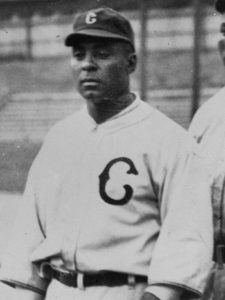
Oscar Charleston
Oscar Charleston was born on this date in 1896. He was a Black baseball player and manager considered by many to be the best all-around ballplayer in the history of the Negro Baseball League.
Oscar McKinley Charleston was born in Indianapolis, Indiana and left school in his mid-teens, and entered the U.S. Army during World War I. He was in the army when he first played organized baseball while stationed in the Philippines. He was the only black player in the Manila League in 1914.
He returned to Indianapolis in 1915 and signed on with the ABCs, the local Negro club for whom he had been a batboy as a child. The barrel-chested Charleston quickly made an impression with his expert play in center field, and his lively bat, which helped the ABCs win a championship in 1916. The black sports press referred to him as the “Hoosier Comet.” Charleston’s career spanned nearly four decades.
A left-hander who hit for both power and average, he was best known for his exceptional speed, strong throwing arm, and volatile temper, often leading to fights on and off the field. He joined the Chicago American Giants in 1919 but returned to the ABCs the following year when the team joined the newly formed Negro National League. In 1921, he enjoyed a typically strong year, batting .434, stealing 35 bases in 60 games, and leading the league in doubles, triples, and home runs. Charleston played with the St. Louis Giants, the Harrisburg Giants (as manager), and the Philadelphia Hilldales in the 1920s.
He joined the Homestead Grays in 1930 and was part of the 1931 team that starred Josh Gibson, Smokey Joe Williams, Ted Page, and Ted "Double Duty" Radcliffe. From 1932 to 1938, he was player-manager for the Pittsburgh Crawfords.
Charleston retired as a player in 1941 with a lifetime batting average of .357 and went on to manage various teams. He guided the Indianapolis Clowns to a Negro World Championship. He was inducted into the National Baseball Hall of Fame in 1976. Oscar Charleston died in 1954.
The Negro Baseball Leagues A Photographic History
By Phil Dixon with Patrick J. Hannigan
Copyright 1992, Jed Clauss and Joanna Paulsen
Ameron House Publishing
ISBN 0-88488-0425-2